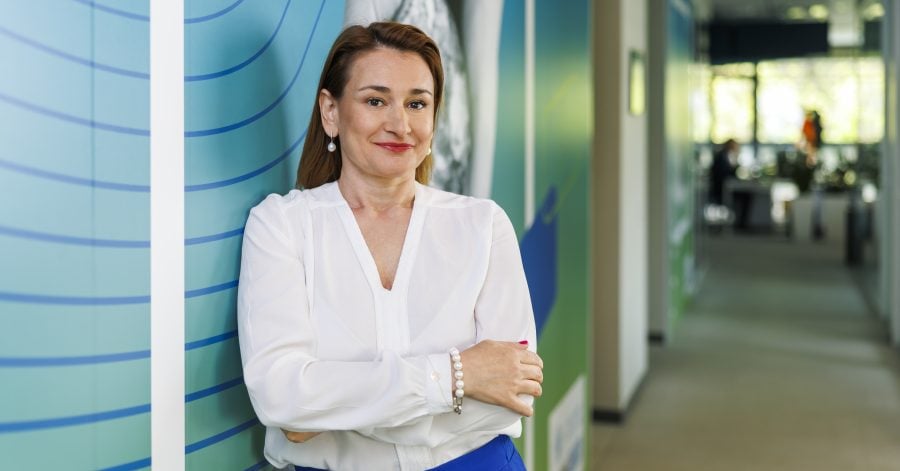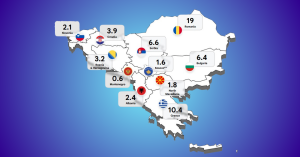Philip Morris International operates in one of the EU’s most tightly regulated markets — a space where every step toward innovation must be negotiated through policy, perception, and public trust.
For Dilyana Yakova, Manager Regulatory Affairs and Sustainability at Philip Morris International, transformation is not only about technology but about how a company behaves within its ecosystem. In this conversation with The Recursive, she discusses how regulation can enable long-term planning, how sustainability has become part of business strategy rather than image, and why social engagement — from youth protection to environmental campaigns — is essential to lasting change.
The Recursive: PMI is openly trying to phase out cigarettes and replace them with smoke-free products. How do you see this transformation playing out in Bulgaria, given the high smoking rates and regulatory context?
Dilyana Yakova: PMI’s ambition to phase out cigarettes and replace them with smoke-free products is bold, especially in Bulgaria, where smoking prevalence remains high, around 37% of the population. However, the transformation is already underway. With over 450,000 Bulgarians using smoke-free products, PMI Bulgaria has made significant strides.
The challenge lies in shifting public perception and behavior, which requires persistent information-sharing, responsible marketing, and collaboration with regulators. The regulatory environment, while strict and inclusive of all tobacco and nicotine products on the market, has been built to acknowledge the risk profile of the alternatives to the traditional tobacco smoking products, such as the excise tax calendar adopted in the local legislation for all tobacco products and their smoke-free alternatives.
Globally, PMI frames sustainability as an engine of innovation and growth rather than just compliance. Where do you see the most meaningful opportunities for impact in Bulgaria?
Today, sustainability is no longer just a compliance matter – it is a key driver of decisions for both consumers and businesses. Ever more companies have started to realise that without a sustainable model, there is no future. Consumers, although surrounded by a commercial culture and conveniences, are increasingly making conscious, more sustainable choices – choosing products with a lower carbon footprint, from recycled materials, and are willing to pay more for an eco-friendly alternative. These products and services must be offered and marketed responsibly, with the target audience in mind and in a way that makes it clear that the company is not chasing business results at any cost. For corporations, sustainability is now also an investment criterion – investors are paying special attention to ESG practices. In addition, it is also becoming a key factor in attracting talent – young people are increasingly looking for employers that offer value, not just high salaries.
At Philip Morris Bulgaria, we are working successfully on all the main topics related to sustainability above. The smoke-free products that the company offers and sells to adult consumers are a better alternative than conventional cigarettes for all those who cannot or do not want to quit smoking. For a tobacco company, this is the most fundamental transformation towards sustainability. Our products have the potential to be less harmful to consumers and society.
Something else that is of utmost importance to Philip Morris and that we want all our business partners to share – we do not offer, and our products should not fall into the hands of minors. In order to respond to the public concerns that have been growing recently, this year we have launched a much more comprehensive and visible campaign, “No Compromise” – we call on our business partners to uncompromisingly comply with the ban on the sale and access to tobacco and nicotine products to minors.
My favorite social and eco-campaign is ChangeThePicture – 5 years ago, we launched the campaign with the aim of changing attitudes towards cigarette butt littering and promoting responsible consumer behavior. In this way, we try to reduce the negative impact of our products on the environment – we try to awaken the eco-consciousness of consumers. The campaign uses the language of art through information and art exhibitions, media events, partnerships with the cultural festivals (Bansko Jazz Fest, Apolonia, ArtPotok, Cinelibri, Burgas International Film Festival, etc.), and academic institutions (National Academy of Theatre and Film Arts, the University of National and World Economy, the Union of Artists. In addition, with volunteer clean-up events, we try to reach a wider audience.
Since 2021, we have also launched a device take-back program, “Recycle Together” for the return of electronic tobacco heating devices that the company offers, for them to be recycled. A large part of this program is related to informing consumers about responsible behavior towards electronic devices that have gone out of use. And in 2024, with our local partner EcoSafe, we also launched a program for the return and recovery of electronic cigarettes.
The EY socio-economic impact report that PMI and PM Bulgaria locally have commissioned shows some impressive numbers on Philip Morris Bulgaria’s footprint. Beyond the figures, what do you think is often overlooked about the company’s role in the local economy and society?
While the EY socio-economic impact report quantifies PM Bulgaria’s footprint on the economy and social development, surely, it also shows very aptly some interesting side aspects:
- Innovation leadership: PMI’s investment in smoke-free products is not just a commercial goal, it’s a scientifically proven technological innovation that transforms not just our company but also leads the whole tobacco industry and has the potential to have a gigantic impact in terms of public health and societal benefits.
- Local partnerships: Collaborations with artists, cultural events, NGOs, and local municipalities amplify the cultural and environmental impact of sustainability campaigns.
- Employment quality: PM Bulgaria is consistently recognized as a top employer, with strong inclusion, equal pay, and well-being programs.
- Community engagement: Through initiatives like “Recycle Together” and anti-littering campaigns, PM Bulgaria contributes to civic awareness and environmental stewardship.
The regulatory environment for tobacco and nicotine is among the strictest in the EU. How does this shape your work in Bulgaria, and do you see regulation here as enabling or slowing down transformation?
Bulgaria’s regulatory environment follows strictly the EU legislation and in the last years has surpassed the EU harmonized rules, with recent bans on disposable vapes and setting caps on nicotine for nicotine pouch products. However, we see regulation can be both a challenge and a catalyst.
Rapid regulatory changes with no appropriate impact assessment can create uncertainty and imbalances in the market. However, comprehensive frameworks proposed and discussed in a transparent manner with relevant stakeholders create predictability in the legislative environment (like the excise tax calendar for all tobacco and nicotine products). They are the base and allow for strategic planning and innovation. It is pivotal for us to ensure compliance with existing regulations while advocating for predictability and balance in the policy-making process.
Looking five years ahead, what would you want the public conversation in Bulgaria to recognize about Philip Morris’s contribution to sustainable development?
Looking ahead, the public narrative around PM in Bulgaria should reflect our leadership in harm reduction, acknowledging PMI’s role in offering scientifically substantiated smoke-free alternatives to smoking. My personal strive is to recognize that sustainability is not a side initiative but is interlinked into our day-to-day business activities and is the core of PMI’s business strategy. Moreover, I would definitely like to see the acknowledgement of our societal contribution: from employment quality to environmental campaigns, PM Bulgaria’s footprint goes beyond economics, it’s about shaping a more smoke-free, cleaner, and better future – one that we all want to share together.








